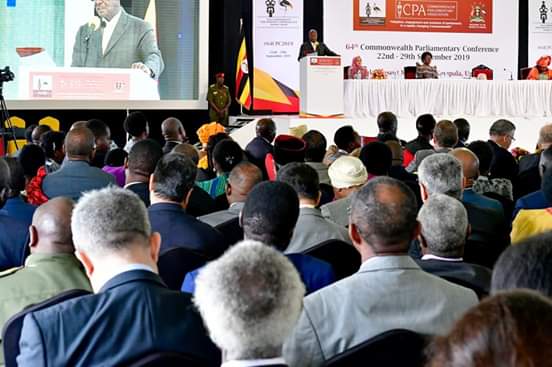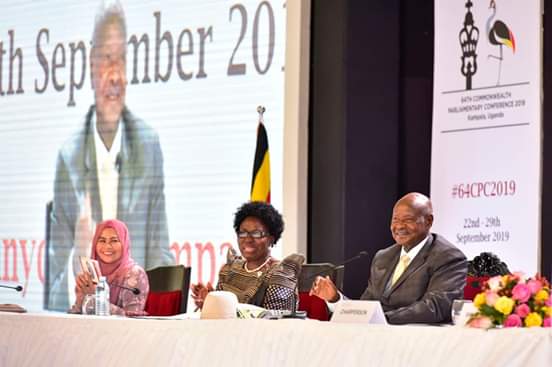
President Yoweri Museveni has tasked the Commonwealth countries to use their numbers to mutually promote investments, work together on security, cultural exchanges and also examine the options on trade without disturbing the Continental Free Trade Area arrangements in Africa.
The president was on Thursday 26 addressing the Commonwealth parliamentarians who are in the country for 64th Commonwealth Parliamentary Conference.
Museveni said that the Commonwealth Association is a great potential with a very big population and also with the benefit of a uniting language.
He said that the Commonwealth countries in substance are democratic, albeit with variations in form, urging that “this is a great achievement.”
The president asked the delegates to promote the spread of the benefits of scientific innovation saying that like in all ages, the advances in science and technology, have always been the primers of change in society for good or for evil; but this time insisting that those advances are only for good and never for evil.
He also reminded them of their role to protect of the environment, “not only a core point of our commitment but also a basis of our agreed point of action.”

Below is Museveni’s full speech
H.E. Vice President, Edward Ssekandi;
Rt. Hon. Speaker of the Parliament of Uganda and President-designate of the Commonwealth Parliamentary Conference;
Secretary General of the Commonwealth;
Secretary General of the Commonwealth Parliamentary Association (CPA);
Distinguished Rt. Hon. Speakers and Heads of delegations from all CPA regions;
The Vice Chairman of the NRM Party;
All Parliamentarians here;
Invited guests;
Ladies and gentlemen.
On behalf of the people of Uganda, I welcome you, the members of the CPA, again, to Uganda. You are most welcome. I say that I welcome you to Uganda, again, because I was very much here when you were here last, 52 years ago. I was not in the meetings themselves. I was, however, 23 years old that time, a first-year student in the University of Dar-es-salaam and already a very active student leader, leading the University Students African Revolutionary Front (USARF). The meeting must have taken place during the short holiday because I remember I was in Uganda and not in Dar-es-Salaam.
I normally, tell my young Party/Movement comrades that what they call history, I call current Affairs. Hence, while for many of you the meeting that took place here 52 years ago is history, for me it is current affairs.
I would like to recognize the support of Her Majesty, Queen Elizabeth the Second, the Queen of United Kingdom, who is the patron of the Commonwealth Parliamentary Conference (CPC).
Let me appreciate the CPA Chairperson, Hon. Emilia Monjowa Lifaka and the CPA Secretary-General Mr. Akbar Khan. I thank you all for the invitation to speak to you today.
The host Speaker of the Parliament of Uganda, Rt. Hon. Rebecca Kadaga, has been doing alot in our country and through the Commonwealth Parliamentary Association networks over the years. These efforts must be the reason we are hosting the CPC in Kampala today. I congratulate her, the Members of Parliament and the Uganda Secretariat of the CPA for successfully organizing this conference and appreciate their hard work.
The newspapers in Uganda have been reminding us that the two controversial issues of that time were: the regime of Ian Smith in Rhodesia and the United Kingdom (UK) joining the European Union (EU) and abandoning the Commonwealth special economic arrangements.
Since that time, the issue of Rhodesia was unilaterally resolved by Africa through the war of liberation executed by Zanu and Zapu, supported by Africa and the socialist countries. It is good that the British government, under Margaret Thatcher, came in, last minute, to facilitate the transition with Lord Soames and those other arrangements.
The issue of the UK membership in the EU is, of course, back in the news, with Brexit. The people of the UK, through internal processes, have the capacity to direct the destiny of that country.
When I met Her Majesty, the Queen in 1987, I told her that the Commonwealth was an Association of great potential. With a population of 2.4billion people, it is the only international organization that I attend and I do not have to put up with the inconvenience of translation with ear appliances.
We can communicate directly through the use of the English language. This is a phenomenon of great potential if it is properly used. We could cooperate in security, investments, culture and governance. Can we revive the preferential trade arrangements? Here in Africa, we are now committed to the CFTA, to COMESA and EAC. What preferential commercial arrangement could Africa have with the UK, with France or with Portugal? Of course, we have some arrangements with the EU that includes France. Maybe we could have arrangements with the UK, even when they are out of the EU, as well as with the other Commonwealth countries such as India, Canada, Australia, Pakistan, etc.; but as the Continental Free Trade Area (CFTA) ─ the whole of Africa, not portions of it.
However, unfortunately, much of this potential is clouded by ideological disorientation, bigotry, ego-centrism and myopia. Alot of time and energy is spent on the enterprise of some groups trying to control the destiny of other people. This is wrong and unnecessary. History is our good teacher on this.
Man has been here for the last 41/2 million years, eversince we evolved as wise primates known as homo sapien sapien, from the earlier species. Right from the beginning, the problems facing man were two: oppression of man by nature and oppression of man by fellow men. Oppression of man by nature involved: floods, drought, disease, landslides, wild beasts, darkness, cold, etc., etc. Oppression of man by man involved: slavery, colonialism, neo-colonialism, fascism, etc. In a recent speech in Japan, I pointed out that for much of the human history, man could notably tame nature on account of the limited knowledge by man as far as the scientific laws were concerned. Gradually, however, man invented fire around 1.5 million years ago; started domesticating crops around 10,000BC; started domesticating livestock around the same time; and invented iron tools, around 1200BC.
Nevertheless, even with those advances, man continued to rely on human muscle and the muscle of beasts. Human muscle involved the use of the hand-hoe, blacksmithing, carpentry, clay-work (okunogoora, kubuumba), etc.; and beast muscle involved the use of donkeys, camels, horses, etc.
This use of human and beast muscle meant low quantities of production and low speeds in terms of activity. However, in the year 1438, Johannes Gutenburg invented the Printing Press. In the year 1698, Thomas Savery invented the steam engine for pumping water and in the year 1823, George Stevenson converted the steam engine to the task of pulling railway engines. This constituted the First Industrial Revolution. Since that time, portions of humanity have been through the second and the third Industrial Revolutions. On account of some historical events, mainly precipitated by the internal weaknesses of Africa and also on account of external greed during the period when some portions of humanity were being emancipated from the reliance on human and beast muscle power, Africa was in the throes of the slave trade, colonialism and neo-colonialism. Therefore, Africa, largely, missed out. Nevertheless, by a combination of factors, Africa, along with other colonized peoples in India, Indonesia, Indo-China, Pakistan, etc., shook off the shackles of colonialism and regained their freedom, the last being South Africa in 1994.
Now that colonialism has been defeated, our advice to friends is that ego-centrism, greed and bigotry should be banished so that we use the enhanced scientific knowledge of man to cause the universal wellbeing of the whole of humanity without exception. Unfortunately, greed continues to obstruct the mutually beneficial interaction within the different portions of the human race and to block the optimum use of scientific knowledge for the universal benefit of man as a whole. Artificial conflicts, propelled by greed or ignorance, always cause avoidable losses and waste time. This greed and ignorance, obscure the facts and impede human co-operation.
The other night, on the 24th of September, at the reception of the Chinese, I pointed out that Karl Marx, in 1848, pointed out that up to that time, in the 41/2 million years of human existence here on earth, man had gone through 4 social systems: the primitive communalism system (some of it still being practiced by some forest dwelling groups in Africa and the Amazon); the slave state (like ancient Rome); feudalism; and capitalism. Of the four social systems witnessed by man up to that time, the only rational ones were the primitive communal system and the capitalist system. The slave system and the feudal systems were restrictive, exploitative and irrational.
Capitalism, by emphasizing the minimization of costs in order to maximize profits, brought rationalization into the production process. Also by rewarding initiatives, it unleashed the productivity of society. In recent times, you have seen how people like Bill gates of Microsoft and Zuckerberg of Facebook, through introducing new technologies, have both built up alot of wealth but also empowered society more. This has been the story of capitalism in the last 300 years in some parts of the Globe ─ innovation, specialization and exchange. By 1929, however, an irrationality had already been detected in capitalism. Maximization of profits meant minimization of costs, which, at that time, included minimization of wages. Low wages meant also low purchasing power. Low purchasing power, meant low demand for the products of capitalism. The capitalist efficiency in the production of goods and services had to be balanced with the commensurate purchasing power; otherwise, the system would collapse.
That is how some economists like Maynard Keynes came up with the socialist idea of the Welfare State, where the State would give free money to the citizens to enable them to buy the products of the capitalist factories.
By that hybridization, the challenge to capitalism of the disequilibrium between the productive capacity of the capitalism and the aggregate demand of the market, was transcended. Countries like China have further pushed forward the strategy of market socialism. As a consequence of this hybridization, the world has seen greater prosperity than in 1929 when capitalism faced the challenge of the disequilibrium between production and consumption.






